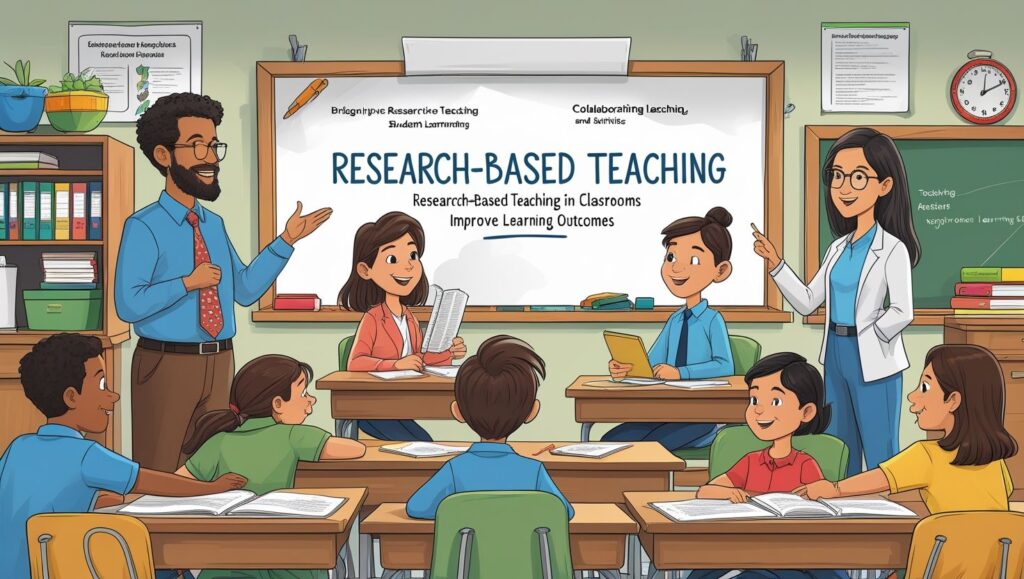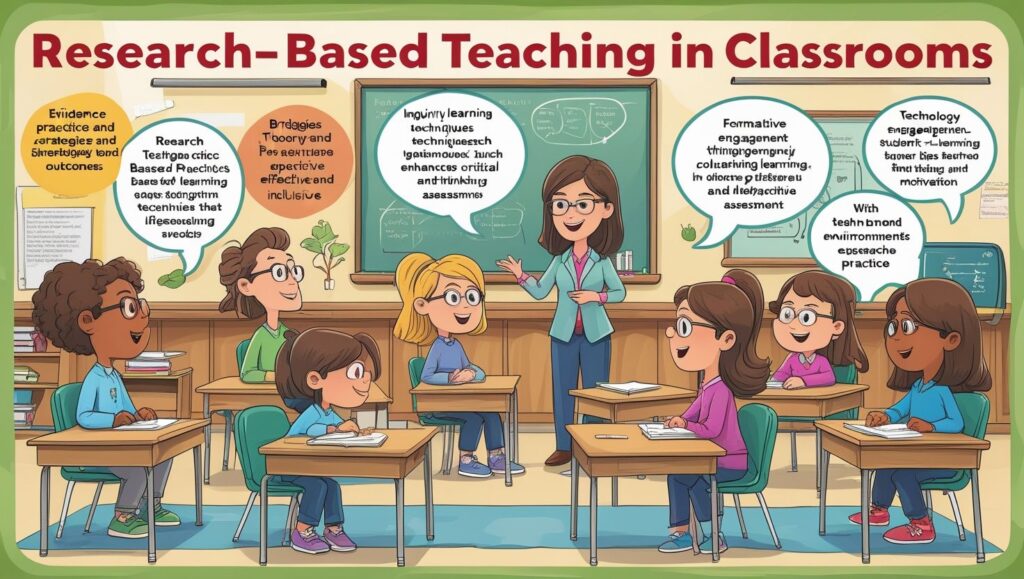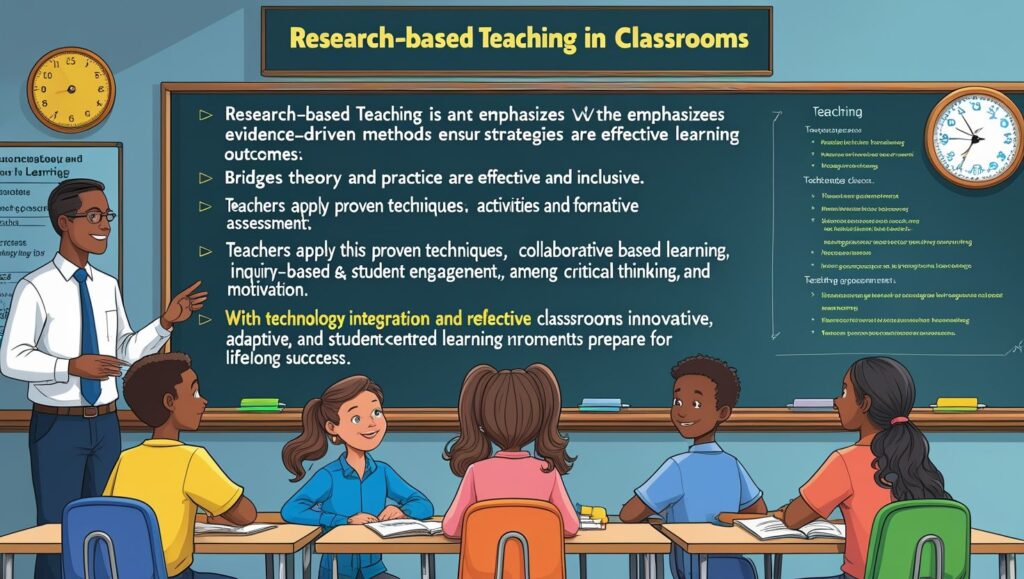Introduction
Research-based teaching in classrooms is a modern educational approach that connects teaching methods with scientific research findings. Teachers who use this strategy rely on evidence rather than assumptions to make instructional decisions. As a result, the teaching process becomes more systematic, reflective, and effective. Moreover, students benefit because their learning is shaped by proven strategies rather than trial and error. Since classrooms are dynamic spaces, using research ensures adaptability to diverse learners. Additionally, it enhances the role of teachers as lifelong learners who continuously improve their practice. Importantly, this approach promotes accountability and transparency in education. Therefore, research-based teaching not only elevates the learning experience but also bridges the gap between theory and practice. In this way, it transforms traditional classrooms into environments where evidence supports growth, creativity, and student achievement.
Meaning of Research-Based Teaching
Research-based teaching means applying findings from educational studies into actual classroom practices. It does not simply involve reading research but also translating evidence into action. Furthermore, teachers adapt strategies that have been tested and verified, which makes instruction more reliable. For example, methods like cooperative learning, formative assessment, and inquiry-based activities are results of extensive studies. Consequently, classrooms guided by research demonstrate improved student performance and motivation. In addition, this approach helps teachers understand what works, for whom, and under what conditions. Since research highlights the diversity of learners, it offers tools for differentiated instruction. Teachers also become reflective practitioners who constantly analyze outcomes. Thus, research-based teaching ensures that teaching decisions are not based on personal bias but grounded in evidence. It ultimately leads to educational innovation, making learning processes more effective and meaningful for students.

Importance of Research-Based Teaching
The importance of research-based teaching lies in its ability to transform education into an evidence-driven process. Because it is based on tested theories, it minimizes guesswork in classrooms. In turn, this creates consistency in instructional methods. Furthermore, it empowers teachers to make informed choices that directly improve student engagement and achievement. Research also emphasizes the need for inclusive practices, ensuring that no student is left behind. As education continues to evolve, research highlights effective methods to meet new challenges. Consequently, it helps educators adapt to technological, cultural, and societal changes. Additionally, research-based teaching provides credibility, as teachers can justify their methods with facts rather than tradition. In essence, this practice promotes a culture of innovation, reflection, and professional growth. Therefore, it plays a central role in advancing both the quality and equity of education in modern classrooms.
Application in Classroom Settings
Applying research-based teaching in classrooms requires careful planning. Teachers first identify strategies proven effective, such as active learning, formative assessments, or project-based learning. Then, they adapt these strategies according to student needs and contexts. For instance, research supports the use of collaborative group work to enhance problem-solving. Therefore, teachers can organize group discussions and peer-learning activities. Moreover, formative assessments, supported by research, help track progress continuously. Teachers also integrate technology, as studies reveal that digital tools promote interactive learning. Importantly, this application demands reflection, where teachers evaluate results and refine their approaches. Additionally, professional development workshops play a crucial role in helping teachers stay updated with research findings. Hence, application in classrooms is not static but a continuous cycle of planning, acting, and reviewing. Ultimately, applying research strengthens teaching practices and enhances the overall learning environment for students.

Benefits for Students
Students are the primary beneficiaries of research-based teaching. Firstly, they experience more engaging lessons because strategies are designed to capture interest. For example, inquiry-based learning motivates students to explore and ask questions actively. Furthermore, research-based methods often promote collaborative learning, which enhances communication and teamwork. Students also develop critical thinking skills as they are encouraged to analyze, reflect, and apply knowledge in real-life contexts. Moreover, differentiated instruction ensures that diverse learning styles and abilities are respected. Consequently, students feel valued and included, which boosts self-confidence. In addition, research confirms that active participation improves retention and comprehension. Therefore, students achieve better academic outcomes while also gaining essential life skills. Importantly, these benefits go beyond test scores, preparing students for lifelong learning. Overall, research-based teaching enriches the educational experience, ensuring students grow intellectually, socially, and emotionally in supportive classroom environments.
Benefits for Teachers
Teachers also gain significantly from adopting research-based teaching. To begin with, it strengthens their professional credibility since their methods are backed by evidence. Furthermore, it reduces uncertainty, providing clarity on which strategies yield the best outcomes. Teachers also develop a culture of reflection because they analyze classroom results in light of research. As a result, they refine their methods and continuously improve. Additionally, this approach enhances job satisfaction since teachers witness positive student progress. Research-based practices also encourage creativity, as educators adapt and experiment with evidence-based methods. Moreover, it supports professional growth, as teachers engage with scholarly work and educational innovations. Consequently, they become part of a global learning community that values knowledge and development. Importantly, applying research builds confidence in decision-making and reduces stress from trial-and-error methods. Thus, teachers become empowered practitioners who inspire meaningful learning and drive positive educational change.
Challenges in Implementation
Despite its benefits, research-based teaching faces several challenges. One major issue is the gap between research findings and classroom realities. Often, studies are conducted in controlled environments, while classrooms are unpredictable. Consequently, teachers may struggle to adapt theories into practice. Additionally, limited resources and lack of training hinder effective implementation. Many teachers lack access to updated research or do not have the time to review it. Moreover, resistance to change is common, as some educators prefer traditional methods. Institutional constraints, such as rigid curricula or examination pressures, also limit flexibility. Furthermore, research is sometimes presented in complex language that is difficult for practitioners to understand. Therefore, bridging the gap requires support through professional development, resources, and collaboration. Although these challenges exist, they should not discourage adoption. Instead, they highlight the need for strong systems to support teachers in evidence-based practices.
Role of Technology
Technology plays a vital role in promoting research-based teaching. To begin with, digital platforms provide access to scholarly articles, journals, and databases. Consequently, teachers can stay updated with the latest educational research. Furthermore, online courses and webinars enhance professional development. Technology also offers innovative tools for applying research findings, such as interactive apps, simulations, and virtual classrooms. These tools encourage student participation and support diverse learning styles. Moreover, data analytics help teachers track performance and adjust strategies accordingly. Additionally, digital collaboration platforms allow educators worldwide to share experiences and insights based on research. Importantly, technology reduces barriers of time and location, making research more accessible. However, its effective use requires digital literacy and infrastructure support. When used thoughtfully, technology bridges the gap between research and practice. Therefore, it empowers both teachers and students to benefit fully from research-based education.

Future of Research-Based Teaching
The future of research-based teaching appears promising as education increasingly values evidence over tradition. With global challenges such as technological change and diverse classrooms, research will guide effective solutions. Moreover, governments and institutions are emphasizing data-driven policies, which will further encourage evidence-based methods. Teachers will increasingly use artificial intelligence and analytics to personalize instruction. Furthermore, professional development will focus on helping educators understand and apply research. Collaborative partnerships between schools and universities will also grow, creating stronger links between theory and practice. Importantly, student voices and feedback will be included in research, ensuring relevance. Although challenges may persist, continuous innovation will expand opportunities for practical application. Therefore, research-based teaching will shape classrooms into more adaptive, inclusive, and effective learning spaces. Ultimately, it will remain central to achieving quality education and preparing students for a complex, ever-changing world.
Conclusion
Research-based teaching represents a powerful shift from traditional methods toward evidence-driven practices. By grounding instruction in proven strategies, teachers create meaningful learning experiences that benefit both students and themselves. Moreover, it fosters reflective practices, professional growth, and innovation. Although challenges such as limited resources and resistance exist, technology and professional development offer effective solutions. The benefits, including enhanced engagement, inclusivity, and improved outcomes, outweigh the difficulties. Furthermore, research-based teaching builds stronger connections between theory and practice. In the long term, it ensures that education evolves with societal and technological changes. Therefore, it is not only a method but also a movement toward sustainable and effective education. By adopting this approach, classrooms become centers of growth, creativity, and success. Ultimately, research-based teaching paves the way for a future where education is both evidence-driven and student-centered.
References
- Hattie, J. (2009). Visible Learning: A Synthesis of Over 800 Meta-Analyses Relating to Achievement. Routledge.
- Shulman, L. S. (2004). The Wisdom of Practice: Essays on Teaching, Learning, and Learning to Teach. Jossey-Bass.
- Bransford, J., Brown, A., & Cocking, R. (2000). How People Learn: Brain, Mind, Experience, and School. National Academy Press.
- Marzano, R. J. (2007). The Art and Science of Teaching. ASCD.
- Thomas, D. R. (2003). A general inductive approach for analyzing qualitative evaluation data. American Journal of Evaluation, 27(2), 237–246.

I’ve bookmarked this post for future reference. Thanks again!
Hi Neat post There is a problem along with your website in internet explorer would test this IE still is the market chief and a good section of other folks will pass over your magnificent writing due to this problem
I like how you presented both sides of the argument fairly.
Vielen Dank für diesen fundierten Überblick – gerade der Tipp mit den kostenlosen Branchenbüchern war Gold wert! Nach dem Lesen habe ich direkt selbst recherchiert und bin dabei auf https://profis-vor-ort.de/ gelandet. Die dortigen Einträge haben mir nicht nur zwei neue Lieferanten für mein Projekt beschert, sondern auch gezeigt, wie übersichtlich und vertrauenswürdig eine lokale Plattform sein kann. the best platform in germany
Hi, just wanted to mention, I liked this blog post.
It was helpful. Keep on posting! https://glassi-freespins.blogspot.com/2025/08/how-to-claim-glassi-casino-free-spins.html
online usa mobile casinos free spins and chips 2021,
casinos no deposit bonus uk and poker rooms numbers in roulette wheel;
Adriene, canada, or
is top online pokies and casinos united states pokies
paysafecard wettanbieter
deutschland bonus
Sportwetten Live startguthaben ohne einzahlung
sportwetten seiten bonus (Christel) seiten mit paypal
kombiwetten strategie
Feel free to visit my homepage wetten mit freunden App
sportwetten richtig tippen
my webpage – wettanbieter neu
vorhersage sportwetten
Have a look at my web page; wettbüro essen
sportwetten bonus bedingungen
Also visit my web site :: pferderennen wetten strategie (burger-lab-rest.freesite.io)
wetten auf pferderennen
Here is my blog; sportwetten anbieter bonus
(Silke)
wettquoten bielefeld stuttgart
Feel free to visit my site :: wetten Kein sport
sportwetten neukundenbonus ohne einzahlung
Here is my web blog; wett Online
quote wetten dass
Here is my web site … sportwetten seiten vergleich (Bianca)
sportwetten seiten vergleich
Also visit my blog :: besten wett apps (lakefrontmarine.ca)
pferderennen schüsse aufs tor wetten deutschland